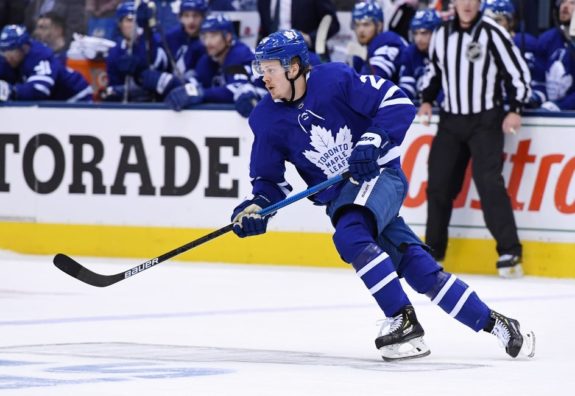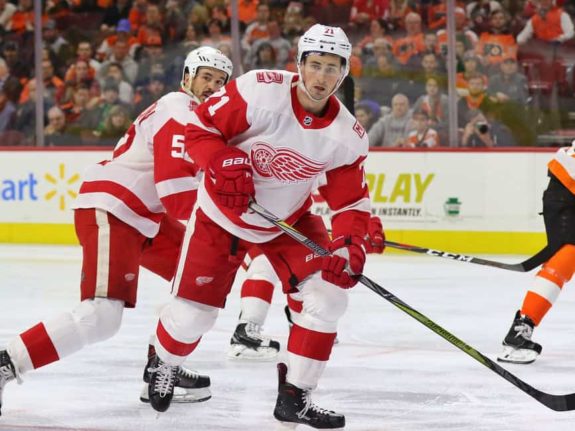One the most prevalent storylines for the Boston Bruins this offseason has centered around the contract extension that’s due for Charlie McAvoy, the 21-year-old stud defenseman who’s seen as the emerging cornerstone of the franchise. These negotiations are a focus every summer as teams determine which young players will be ticketed as the future core of the team and prioritized when contract negotiations roll along.
While it’s obviously important for the Bruins to lock down a player like McAvoy — letting him slip away would be inexcusable — the front office must also balance the importance of negotiations with other players. When it comes to contract negotiations, there’s always another one lurking.

One player the Bruins will keep in mind as they continue cutting into their salary space is Jake DeBrusk, whose entry-level contract expires after next season. Like McAvoy, DeBrusk’s entry-level deal will leave him as a restricted free agent, meaning that Boston will have exclusive rights to negotiate a contract with him. (In case you aren’t familiar with the ins and outs of restricted free agency, you can find an explanation here).
DeBrusk’s Career Thus Far
DeBrusk was drafted by the Bruins in the first round of the 2015 NHL Entry Draft. The opening round of that draft was thrust under the microscope for the Bruins, who made three consecutive selections with the 13th, 14th, and 15th overall picks. Of the three players drafted — Jakob Zboril, DeBrusk, and Zach Senyshyn — only DeBrusk has broken through thus far as a regular NHLer.
After one strong season with the Providence Bruins (19 goals, 30 assists in 74 games), DeBrusk made his debut for Boston’s varsity club on the opening night of the 2017-18 season, burying a goal early in the second period to quickly make a name for himself. That goal turned out to be a good omen as DeBrusk enjoyed a productive rookie season.
The left-winger recorded 16 goals and 27 assists in his debut campaign, finishing 12th among Calder voting for the league’s top rookie. Nestled into the second line on David Krejci’s left side, DeBrusk quickly established himself as a dangerous scoring option. His work ethic on the ice was impressive in itself. He plays (and celebrates) with a lot of passion and proved willing to fight in the dirty areas to make things happen.
His breakout regular season was followed up by an even more impressive postseason debut. The opening round series against the Toronto Maple Leafs — DeBrusk’s first taste of playoff hockey — went a full seven games. DeBrusk recorded points in six. He finished the series with five goals and two assists, including two pivotal goals in the decisive Game 7.
The Bruins finished the postseason with a 4-1 record in games when DeBrusk scored. This was telling, as he was held to just a single goal in Bostons five-game series loss to the Tampa Bay Lightning. Despite quieting down in Boston’s second-round defeat, DeBrusk had done enough to earn himself high expectations for his sophomore season.
In the first half of the 2018-19 season, though, the Edmonton, Alberta native appeared to suffer from the infamous “sophomore slump.” On Feb. 10, having played 47 games, he had recorded just 19 points (15 goals, 4 assists). His 48th game of the season featured a much-needed three-point night against the Chicago Blackhawks, which seemed to flip a switch for the young winger. He recorded ten points in five games between Feb. 12 and Feb. 20, and went on to finish the season with 27 goals and 15 assists in 68 games.
In the postseason, DeBrusk was quieter, tallying eleven points in Boston’s 24-game run that ended with a heartbreaking Game 7 loss in the Stanley Cup Final. It’s likely that DeBrusk’s lack of production throughout the postseason had to do with the injury he sustained after falling victim to a cheap cross-check from Toronto’s Nazem Kadri in the first round, which landed the Maple Leaf forward a suspension that would go on for the remainder of the series. After the Stanley Cup Final, DeBrusk said that he had been battling an injury stemming from the first round, leaving many to question whether he should have remained on the sideline for longer.
All in all, DeBrusk has had a pretty impressive first two seasons in the NHL. While he may not draw the same attention as fellow 2015 draft picks Connor McDavid, Jack Eichel, or Matt Barzal, he’s certainly proven himself as an NHL-caliber producer with a bright future.
DeBrusk Player Comparisons
The best way to gauge what a player’s future contract might look like is to look at the contracts of similar players across the league. In the case of Jake DeBrusk, there are a number of players that we might use as a basis of contract predictions.
Kasperi Kapanen
For our first player comparison, look no further than Boston’s most common playoff foe of late, the Maple Leafs. Toronto recently signed 23-year-old right-winger Kaspari Kapanen to a three-year contract worth $3.2 million per season.
There are a few reasons that DeBrusk could be looking at a contract similar to the one Kapanen signed in June. For starters, Kapanen and DeBrusk produced at similar rates last season. While Kapanen got off to a faster start, DeBrusk eventually picked up the pace and evened it out. In fact, through 68 games (the total number of games DeBrusk played), Kapanen had tallied 42 points — exactly the same as DeBrusk’s total in as many games. DeBrusk finished the season producing an average of 2.3 points per 60 minutes (P/60), a bit higher than Kapanen’s 2.0 P/60.

Advanced statistics show more daylight between the two players, particularly when comparing their possession stats on either end of the ice. Over the course of their short careers, DeBrusk’s defensive zone exit statistics (72nd percentile in zone exits per 60 minutes) are stronger than Kapanen’s (47th percentile), while Kapanen has a significant advantage in zone entries per 60 minutes (Kapanen is in the 90th percentile, DeBrusk is in the 43rd).
Kapanen also has an advantage in shot contributions per 60 minutes (Kapanen sits in the 88th percentile, DeBrusk in the 66th). When it comes to even-strength Corsi For % (CF%) — the motherload of all possession stats — DeBrusk’s 55.1 CF% outpaces Kapanen’s 52.5 CF%. Now, how much weight these statistics are given by front offices and player camps when negotiating contracts is uncertain, and likely varies from office to office, but it’s worth considering.
Of course, there are some other significant differences as well. DeBrusk has played most of two full seasons and, so far, he’s been consistent from year to year. He finished last season with one fewer point in two fewer games, (with goals accounting for a much larger percentage of his point total) than in 2017-18. Kapanen, while playing just five fewer games in his career, has had those games spread out over four seasons. His 44 points in 78 games demonstrated promising signs of improvement last season, but two seasons ago, he was limited to just nine points in 38 games.
Obviously, with players as young as DeBrusk and Kapanen, recent stats weigh more heavily than dated ones. Still, the consistency in production from one season to the next is worth considering, and in this case, it could help DeBrusk — that is if he can carry that consistency (or boost it) through next season.
Sam Reinhart
Another player who might be useful as a comparison is 23-year-old Sam Reinhart of the Buffalo Sabres. Reinhart was drafted second overall in 2014, a year before DeBrusk was selected in the first round by Boston. As the second overall pick, Reinhart saw some playing time the next season, appearing in nine games with the Sabres in 2014-15, earning one assist.
Reinhart became a regular in the Sabres lineup the following season, appearing in 79 games. As a 20-year-old rookie, the Sabres’ center notched 42 points (one fewer than DeBrusk in his rookie season, although DeBrusk was a year older as a rookie), and finished ninth among rookies in Calder Trophy voting. While Reinhart and DeBrusk finished with similar point totals, DeBrusk played in fewer games and therefore has a higher point per game total. The Bruins’ winger notched 0.61 points per game as a rookie, while Reinhart averaged 0.53 points per game.

Since Reinhart entered the NHL as a rookie at 20 years old, he reached restricted free agent status prior to the 2018-19 season, before his age-23 season. DeBrusk, on the other hand, will be a year older by the time he reaches free agency, as his contract expires after his age-23 season. In his contract season leading up to free agency, Reinhart appeared in a full 82 games, burying an even 25 goals and 25 assists for a clean 50 points. That surpassed his sophomore season total of 47 points in 2016-17. He went on to sign a two-year deal worth $3.65 million per season.
Reinhart, like DeBrusk, has been a streaky player at times – seemingly unstoppable at some points of the season, while hiding in the shadows for other stretches. That being said, he’s established himself as a dangerous scoring option at the NHL level, something that DeBrusk has done over his first two seasons as well.
There’s also something to be said about DeBrusk being a winger and Reinhart a center. Particularly in today’s NHL, where centers are relied on as more than ever to play a two-way game, centers can be more valuable than wingers and could draw more money on the market. Still, DeBrusk and Reinhart are similar enough for comparison.
Dylan Larkin
If DeBrusk’s camp had the option to take anybody’s contract on this list, it would be Dylan Larkin, and for good reason. The Detroit Red Wings’ center signed a five-year deal worth $30.5 million with the Red Wings before last season and based on his point total, it’s not hard to see why.
Larkin exploded for 73 points after signing his contract last season, an extremely impressive haul for a 22-year-old. Larkin is a centerpiece in the future of Hockey Town, and DeBrusk almost certainly won’t sniff a contract as luxurious as Larkin’s, but interestingly enough, their production totals over their first few seasons aren’t far off.

Larkin was drafted by Detroit with the 15th selection in 2014 and debuted in 2015-16 at just 19 years old. As a teenage rookie, Larkin tallied an impressive 45 points in 80 games, finishing fifth among rookies in Calder Trophy voting. The next season, though, he too suffered from a sophomore slump, tallying thirteen fewer points (32) in as many games.
Ultimately, Larkin’s 0.48 points per game over his first two seasons is well below DeBrusk’s 0.62 points over his first two seasons, but there are other factors at play. For one, Larkin was younger during his first two seasons (which certainly helped his contract negotiations) and had less help surrounding him than DeBrusk.
That being said, DeBrusk would have to turn out a heck of a season this year to match Larkin’s third-year campaign. The Red Wings’ center appeared in a full 82 games in his contract year of 2017-18, and nearly doubled his point total from the year before, tallying 63 points. Strangely enough, Larkin actually tallied one fewer goal than the season before, despite totaling about twice as many points as the season before. However, he jumped from 15 assists in 2016-17 to a whopping 47 assists the next season, boosting his point total dramatically.
At just 21 years of age, Larkin had already surpassed the 60-point plateau and had locked himself in as a key piece of the Red Wings’ future. While DeBrusk has certainly looked impressive in his first two seasons, he hasn’t quite reached “star” status with his team yet – something that Larkin has earned through a combination of skill (a 60-point season at such a young age will do that), as well as the caliber of players surrounding him. To put it simply, DeBrusk is important to the Bruins, but not as important as Larkin was to the Red Wings when he needed re-signing.
As a result of this, DeBrusk won’t pull a $6.1 million AAV deal as Larkin did, but it does go to show you how much an explosive third season can do for a player with an expiring rookie contract. Larkin’s 63-point season in 2017-18 certainly boosted his paycheck, just as a breakout season from DeBrusk could boost his, though likely not as much.
The Verdict
Obviously, there are various factors that will impact how much DeBrusk signs for next offseason — the largest being how well he plays next season. Based on what we’ve reviewed, however, we can do some speculation.
If DeBrusk continues to produce at a rate similar to the last two seasons, I wouldn’t be surprised to see him pull a deal worth about $4 million per season – perhaps a little more or less depending on this season’s totals. A breakout season (like Larkin’s), an injury, or a dramatic drop in point totals could push his value in either direction, but based on the current outlook, DeBrusk should pull a contract in the upper-$3 million or low $4 million per year range.

Of course, the amount of term he’s looking for in the contract will also play a role. Many players sign mid-length deals after their entry-level contract expires, and I’d expect DeBrusk to look for something in the three-to-four year range. A three-year deal for the Bruins winger would leave him with unrestricted free agent status after his age-26 season, meaning he could cash in on at least one more big contract during his prime, if all goes according to plan.
In the coming weeks, as the Bruins look to lock down McAvoy and Brandon Carlo, be sure to keep DeBrusk in the back of your mind, as we’ll be right back here with him next year.